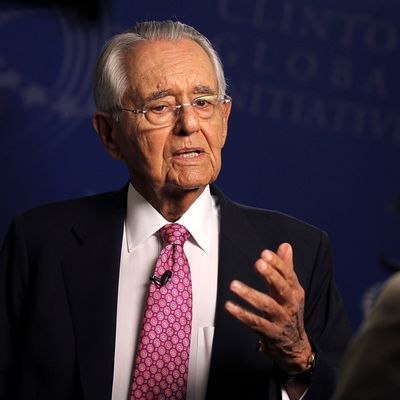
Buried in Joshua Green’s piece on the deficit-hawk movement in this week’s Bloomberg Businessweek is a truly stunning figure: Pete Peterson, the private-equity executive who became the godfather of the movement to get Americans to care about the national debt, has spent roughly half his Wall Street fortune, or $500 million, pushing the cause.*
That money has gotten shockingly few results. As Green notes, the deficit-hawk movement Peterson has led for more than three decades has had barely any discernible impact on budget talks in Washington, and its dire warnings about excessive government spending have gone mostly unheeded. Peterson’s latest project, the Fix the Debt campaign he helped bankroll, is dismissed as high-minded garbage by the right and a Trojan Horse attack on Social Security by the left. And unless they’ve seen the video of Alan Simpson doing the “Gangnam Style” dance, most Americans have never heard of Fix the Debt or its youth-group spinoff, the Can Kicks Back.
I’m torn on whether Peterson’s $500 million amounts to wasted money on a lost cause, or a high-minded and patriotic attempt to bring the rest of the country around on an issue he cares deeply about.
To the first point, it’s sad to think of what else Peterson’s $500 million could have done. It could have bankrolled a thousand midsize charities. It could have made meaningful contributions to fixing global poverty, or curing AIDS, or whatever Peterson’s pet cause might otherwise have been. Or, if his pet cause had still been deficit reduction, he could have used his money to do things that might have made real progress on that front. (Green notes that he could have done more to fix the debt by figuring out how to lower health-care costs.)
Instead, Peterson’s private-equity bounty financed a decades-long campaign to instill deficit panic among “thought leaders” with a never-ending series of symposiums, conferences, and colloquia, and among the general public with jokey YouTube videos and an all-out media blitz. In all, Peterson’s efforts may go down as the most expensive PR campaign in history, but not much else.
This scene from Green’s story is fairly indicative of how divorced Peterson’s enthusiasm for his cause is from actual results:
When I met Peterson in January, the New York Times had just published a story noting that people in both parties agreed that the Campaign to Fix the Debt had had no impact at all on the deficit talks. Peterson hadn’t known about the story and was disappointed when he found out.
In Peterson’s defense, many rich people have spent their money in dumber ways. They’ve blown hundreds of millions of dollars backing failed political candidates, buying palatial mansions, and whizzing around on private jets. They’ve donated vast sums to already-rich business schools, public parks that don’t need the money, and their dogs. At least Peterson, who is right that the national debt is a long-term problem (though not a cause for short-term panic) was identifying a real problem and trying to do something about it, even if that effort has mostly failed.
It is odd, though, that Peterson has thrown such vast sums down the deficit-scare drain and is planning to spend another $500 million on the cause. Private equity, the industry that made Peterson his fortune, is all about being able to turn on a dime and exit unprofitable investments before they get out of hand. I can’t quite figure out how Peterson, who was a legitimately great investor in his day, has failed to recognize the massive money-sink sitting in front of him.
If nothing else, Peterson can console himself with the fact that his deficit-panic mentality has infiltrated mass consciousness. A recent Bloomberg News survey found that 62 percent of Americans (wrongly) believe the U.S. deficit is growing, while only 6 percent correctly said it was shrinking. That widespread misinformation almost certainly wouldn’t have happened without Peterson’s activism. Still, I doubt it’s enough to make him feel like his money has been well-spent.
*Update: The Peterson Foundation calls to clarify that although Peterson has given nearly $500 million to the foundation to promote the cause of debt reduction — $458 million, to be exact — much of that money has not yet been spent.





























